Creating an identity of asking questions
Look at the picture to the right.
Do you remember it? Do you recall the uproar it caused?
What was your first reaction when you first saw the photo? What did you believe was happening? What was your opinion of the people in the photo?
Take everything in...
The teen with a smirk on his face.
The red MAGA hat.
The elder Native American man.
The crowd of people encircling them.
Now, I ask you: Have you ever stopped to ask if you know the real story behind this photo?
Did you know that the boy in the photo, a high school student from Kentucky named Nicholas Sandmann, was actually among a group of his classmates that were trying to protect an Indigenous Peoples March from hecklers that had been shouting racist and incentive taunts?
Did you know that Sandmann and his friends tried to drown out the hecklers with school chants and dances, which the Native American marchers — including the elder in the photo — mistook as aggressive and disruptive behavior and confronted the teens?
Did you know the boys had purchased the MAGA apparel simply as souvenirs of their trip to Washington D.C.?
Feel free to read more about the story, and then ask yourself this: Have my feelings about the photo changed?
With the work that I’m doing to get people to pause and ask more questions — to find common ground with people with whom you disagree — the most frequent feedback I get from those of you trying to put this into practice is that it’s really difficult.
It’s hard to pause and ask questions.
As I said in my first TEDx Talk, it’s hard to not come off as condescending, it’s hard not to let your opinions and assumptions drive the questions you ask, and it’s hard not to let your emotion rise up to the point that it boils over.
And no doubt, that photo caused a lot of opinions, assumptions, and emotions to burst forward.
Emotion isn't a bad thing. We're emotional creatures. Emotion is a good thing … until it’s not.
But that's a different topic for a different day.
Asking questions is not something that we naturally feel pulled to do in disagreements.
Instead, we quickly rush to decisions to make our argument, to stake our claim, and to be right. It’s ingrained in our culture and upbringing.
I mean, we take debate classes in high school and college but we never take listening classes.
But outside of changing the education system, here’s a thought for you: Yes, asking questions is hard, but just about anything worth doing is hard and it takes practice to get good at that hard thing.
LeBron James didn’t just all of a sudden become one of the world’s greatest basketball players. That’s a really hard thing to do. It took him hours and hours of practice working on all parts of his game to be the type of player that he is today.
Think about any high achiever you know or someone who excels at something difficult, and you can guarantee that they’ve put in the hard work. We may not always see that hard work being done, but it's there in the background.
And it’s no different with asking questions.
You can establish a process to get better at asking questions. It's going to take hard work, but you can eventually get there.
So here are the steps:
1. Build the habit
You’ve probably heard that building a habit takes 21 days, or 58 days, or 75 days. Whatever that range is for you, this is the first step you must take to make asking questions a part of who you are and how you approach difficult conversations.
Consciously make the decision to pause and consider asking a question rather than throwing out your opinion. That’s a habit you can establish and build, but it will take some conscious effort.
2. Alter your lifestyle
As you build the habit, eventually, asking questions becomes more natural and you don’t have to put as much effort into remembering to ask questions, it just happens.
At work, you’re asking more questions. In your conversations with your spouse or partner, you’re asking more questions. With your kids, you’re asking more questions. With strangers on the Internet, you’re asking more questions.
This repeated behavior becomes a part of your life over perhaps a few months or even a year or two.
3. Establish your identity
Eventually, you become known as someone who asks questions — good questions. It’s just who you are.
And you ask questions not just of others, but you ask questions of yourself first.
You ask questions because you are curious about where your own thoughts and ideas form. You’re curious about the world around you. You’re curious about finding common ground with other people.
Your identity as a person becomes rooted in being interested in other people and what they believe and not just simply getting your voice and opinion out there and heard.
All of this is a big shift because we're talking about your identity and how the world sees you, and it could take many years before this all feels “right.”
It can be done, but it must be practiced. Practice building the habit that eventually becomes the way you show up in the world.


